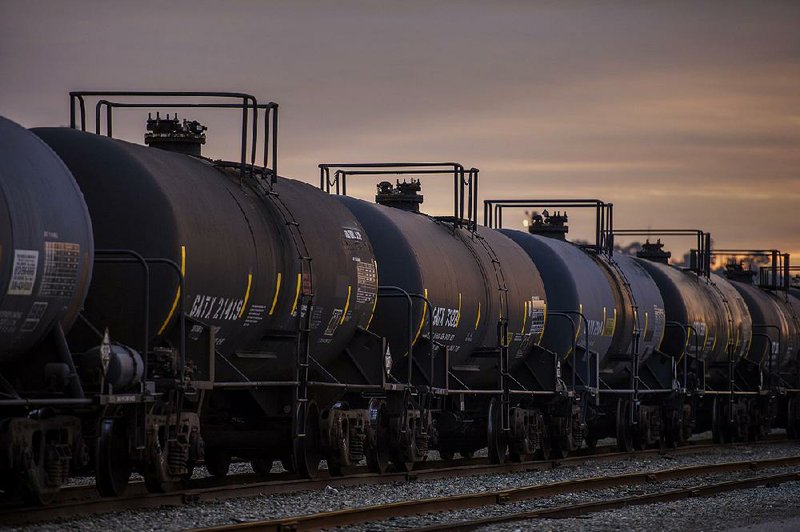A week after a CSX train hauling crude oil derailed and exploded 30 miles southeast of Charleston, W.Va., on Feb. 16, its mangled, charred tank cars were being hauled from the crash site.
Of the 27 cars that derailed, 19 were engulfed in flames. The wreckage burned for almost three days.
"It's amazing no one was killed," said John Whitt, whose home is one of a handful clustered near the crash site, along the banks of the Kanawha River. Some were within 30 yards of the site. One home was destroyed.
Exploding oil trains have emerged as a dangerous side effect of the U.S. energy boom. A lack of pipelines connecting new fields in North Dakota and Texas to refineries and shipping terminals has led to an almost 5,000 percent increase in the amount of oil moved by trains since 2009.
And, much of the crude is being carried in tank cars designed a half-century ago that regulators have long deemed inadequate for hauling the highly flammable types of crude coming out of North Dakota.
The West Virginia accident came less than a month after the U.S. Transportation Department sent a proposal for new safety standards to the White House for approval.
The rules were supposed to have been submitted by the end of last year but were delayed because of lobbying from railroads, oil producers and tank-car manufacturers. Part of the problem has been crafting regulation that's broad enough to address a range of safety issues -- including speed limits, braking systems and track maintenance -- while also withstanding legal challenges from the affected industries.
"All the stakeholders have their opinions, and they are aggressive in protecting their turf," said Joe Szabo, who stepped down as head of the Federal Railroad Administration in January.
The kind of tanker involved in the West Virginia crash has been built since 2011. Outfitted with a reinforced body and tougher valves to keep oil from leaking during a wreck, the CPC-1232 was intended to be an improvement on the DOT-111 tank car designed in the 1960s that's still prevalent on the tracks today.
The Transportation Department is pressing the industry to make further improvements to newer tank cars.
Under the latest version of the draft regulation, tank cars would have thicker shells and better brakes and valves. Even then, analysts say, risks remain.
"You could make tank cars resemble Army tanks, and it still isn't going to stop accidents," said Brigham McCown, a former administrator at the Pipeline and Hazardous Materials Safety Administration. Last summer, the Transportation Department predicted that trains hauling crude or ethanol could derail 10 times a year over the next 20 years, causing $4.5 billion in damage.
Despite those forecasts, the industry's lobbyists appear to have extracted concessions. U.S. regulators initially had called for a two-year phaseout of oil tank cars -- both the old and the improved version. The revised proposal maintains the phaseout schedule for the old cars but extends the deadline for some of the newer tankers to as long as a decade, according to three people familiar with the document who weren't authorized to speak on the record.
Executives from the Railway Supply Institute, a trade group representing companies that make tank cars, argue there isn't enough manufacturing capacity to turn over the fleet in a couple of years.
The institute's president, Tom Simpson, said too aggressive of a deadline would force oil producers to dial down production or move more of their crude in trucks, which come with their own safety hazards.
"The option is we don't have it, or we use highways," he said.
Sarah Feinberg, the acting administrator of the Federal Railroad Administration, said the rule-making process has been slow because of the need to craft comprehensive regulations that go beyond mandating new tank cars.
"A new tank car is not a silver bullet," she said. "If the product you put into transport is safer, then a lot of these other issues are easier to solve."
Under regulations adopted last year, oil companies in North Dakota starting in April will have to remove volatile gases such as propane from crude before pumping it into a rail car. According to the North Dakota Department of Mineral Resources, that will raise costs by an estimated 10¢ per barrel for the energy industry, which says it's already bearing too much of the burden of tougher regulations.
Based on the draft proposed last summer, the Railway Supply Institute has estimated the new safety requirements for tank cars would add about $13.6 billion in shipping costs in the first year, with oil companies and refiners anticipating they will foot some of the tab in the form of higher lease rates for rail cars.
"It's time we focused attention on the root cause of the problem and get the railroads to keep their trains on the tracks," said Charlie Drevna, president of the American Fuel and Petrochemical Manufacturers.
It likely will be months before the cause of the West Virginia crash is known. One thing that doesn't appear to be an issue is speed. The train was traveling 33 mph, below the speed limit of 50 mph. Jim Hall, former National Transportation Safety Board chairman, would like to see the trains go even slower.
"We don't have short-term adequate protection to prevent these events other than slowing the trains down," Hall said.
SundayMonday Business on 03/01/2015

